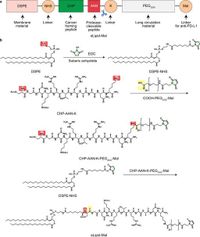Researchers in the realm of cancer treatment have unveiled a significant advancement in the fight against colon cancer: a novel protease-cleavable liposome engineered to enhance the efficacy of immune checkpoint blockade therapy. This innovative liposome, designated eLipo anti-PD-L1, is designed to simultaneously deliver therapeutic antibodies and chemotherapeutics directly to tumor sites, significantly improving therapeutic effectiveness in colon cancer patients.
Colon cancer remains one of the leading causes of cancer-related mortality worldwide. Despite advancements in treatment, patients diagnosed with advanced stages of this disease experience particularly poor prognosis. Current treatment largely involves surgery, chemotherapy, and radiation therapy; however, responses vary widely among patients. Immune checkpoint inhibitors, such as those targeting programmed cell death protein 1 (PD-1) and its ligand PD-L1, have shown promise but have limited effectiveness, particularly in colorectal cancer. More specifically, only a minority of patients achieve responses to these therapies. Researchers have identified that the immune microenvironment of colorectal tumors often lacks effective immune cell activation, making targeted therapies like eLipo anti-PD-L1 critical for improving outcomes.
The innovation lies in the liposomal design of eLipo anti-PD-L1, which incorporates legumain-specific, protease-cleavable components. This enables the liposome to selectively release its payload—anti-PD-L1 antibodies and doxorubicin—upon reaching colon tumor sites where legumain is abundantly expressed. The liposome, when cleaved, releases pegylated anti-PD-L1 and a cancer-homing doxorubicin liposome, effectively targeting the cancer cells and enhancing immune activation and chemotherapy.
Through a series of experiments conducted on colon cancer-bearing mice, researchers demonstrated the liposome's significant cancer-targeting and immune-activating effects. Not only did eLipo anti-PD-L1 enhance the accumulation of the therapeutic agents at tumor sites, but it also intensified the immune response within the tumor microenvironment, leading to improved outcomes in tumor shrinkage.
Moreover, further mechanistic analysis revealed that key genes related to T cell differentiation and signaling were potentially mediating these enhanced effects. In evaluations of human colorectal cancer tissues, expressions of both PD-L1 and legumain were confirmed, reinforcing the suggested clinical applicability of this therapeutic strategy.
In their findings, the authors wrote, “Our study thus suggests that eLipo anti-PD-L1 may be a feasible vector for co-delivery of immunochemotherapy for colon cancer.” This statement encapsulates the excitement around harnessing this dual-delivery mechanism, which not only tackles tumor cells but also boosts the immune system’s attack against them.
This novel drug delivery system represents a groundbreaking leap forward in colon cancer immunotherapy. Given the prevalent expression of PD-L1 in 89% of colorectal tumors, enhancing the delivery and efficacy of checkpoint inhibitors could vastly improve treatment options available to patients facing this aggressive disease.
Looking ahead, the protease-cleavable liposome approach adopted in eLipo anti-PD-L1 holds promise not just for colorectal cancer but potentially for other immune-resistant solid tumors. As researchers continue to refine this technology, the hope is that we may witness a new era of effective immunotherapy that harnesses the body’s own defenses to combat various forms of cancer.
Overall, this study illustrates the meticulous planning and execution behind innovative cancer treatments, signaling a much-needed development in the often challenging field of colorectal cancer therapy.




